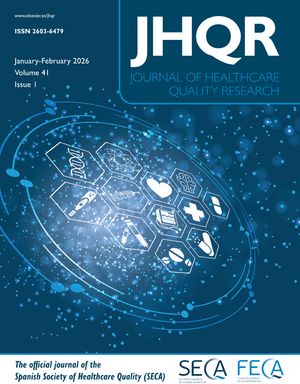El estudio de las reclamaciones realizadas por los usuarios en un Servicio de Urgencias, representa un parámetro de calidad asistencial que nos permite valorar la satisfacción del usuario y conocer los aspectos mejorables en el proceso de atención al usuario. El objetivo es conocer la incidencia y analizar los motivos de las reclamaciones realizadas en un Servicio de Urgencias Pediátricas, asícomo su posible repercusión en la evolución clínica del paciente.
MétodosEstudio descriptivo y retrospectivo analizando las reclamaciones efectuadas en el Servicio de Urgencias Pediátricas de nuestro centro, entre enero-96 y julio-99. Para ello confeccionamos una hoja de recogida de datos y posteriormente revisamos las historias clínicas de los pacientes implicados.
ResultadosSe valoran un total de 61 reclamaciones, con una tasa anual media de 0,23/1000 urgencias pediátricas atendidas en urgencias. No hallamos diferencias entre el sexo de los pacientes, ni entre el parentesco de quien formula la queja. La forma de realizar la reclamación fue como sigue: 72% escrita, 13% verbal, 15% telefónicamente. Con relación a la distribución de los días de la semana, encontramos que el viernes con un 25% es el de mayor incidencia, seguido de lunes con el 20% y domingo con un 15%. El mes del año con mayor número de reclamaciones es febrero (18%), seguido de enero y junio (15%) y marzo (10%). Los motivos más frecuentes de reclamación fueron: demora excesiva en la atención urgente (37%), insatisfacción asistencial (30%), trato personal inadecuado (12%). La mayoría de reclamaciones se dirigieron hacia el estamento médico (89%), seguido del personal de enfermería (5%). En ningún caso el motivo de reclamación se ha relacionado directamente con la evolución clínica del paciente y la mayoría de usuarios volvieron, por otros motivos, al servicio de urgencias.
Conclusiones1. La causa más importante de reclamación, y por tanto, de descontento del usuario es la demora asistencial, seguido de insatisfacción asistencial. 2. En ningún caso, la demora asistencial ha supuesto cambio clínico en el paciente. 3. A pesar de la reclamación del usuario, la mayoría, en caso necesario, acude nuevamente solicitando asistencia.
The analysis of the claims made by the users of an Emergency Department is an indirect parameter of quality of care that allows us to measure the satisfaction of the user and to detect the deficiencies of the system. To know the incidence and to analyse the reasons of the claims made in a Pediatric Emergency Department, as well as their repercussion in the clinical evolution of the patient.
MethodsA retrospective descriptive study analysing the claims was conducted in the Pediatric Emergency Department of our centre, between January-96 and July-99. We reviewed the clinical records of the implied patients.
ResultsSixty-one demands were collected, with an average annual rate of 0,23 demands /1000 emergencies. We did not find differences between the sex of the patients, no between the parent who interpose the demand. The way to make the claim was written in 72%, verbal in 13% and by telephone in 15%. We found that Friday (25%) is the weekday of the highest incidence, followed by Monday (20%) and Sunday (15%). The month with the highest number of claims was February (18%), followed by January and June (15%) and March (10%). The most usual reasons for claims were: delay in visiting the patient (37%), disagreement with the care (30%) and inadequate behaviour (12%) Most of claims were against the medical personnel (89%), followed by nurses (5%). In no case the reason of the demand has been directly related to the clinical evolution of the patient and most of users have returned again to the Emergency Department.
Conclusions1. The most important cause of claims and, therefore, displeasure of the user are the delay in visiting the patient, followed by the personal dissatisfaction. 2. In no case the delay in visiting the patient has been related to a bad clinical outcome. 3. In spite of the claim of the user, most of them return again to the Emergency Department if necessary.






